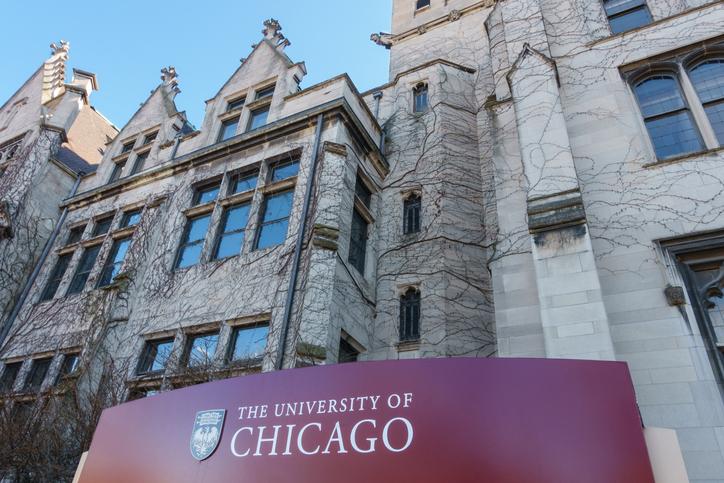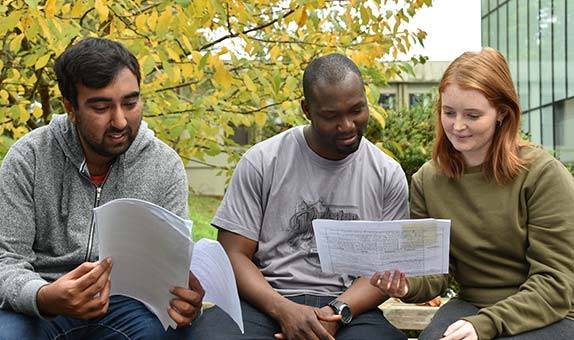University of Chicago
Nestled in the vibrant Hyde Park neighborhood of Chicago, Illinois, the University of Chicago stands as a bastion of intellectual prowess and academic excellence. Established in 1890 by the American Baptist Education Society with an endowment from oil magnate John D. Rockefeller, the university has since carved out a distinctive place in the landscape of higher education, renowned for its rigorous academic programs and groundbreaking research.
Table of Contents
A History of Excellence
From its inception, the University of Chicago has been synonymous with academic rigor and intellectual curiosity. Its founding principles emphasized a commitment to rigorous inquiry and open discourse, setting it apart from other institutions of its time. Early figures such as philosopher John Dewey and sociologist Albion Small helped shape its interdisciplinary approach to education, which continues to influence its academic ethos today.
Academic Programs and Research
The University of Chicago is organized into five academic research divisions and seven professional schools, offering a wide array of undergraduate, graduate, and professional programs. Known for its strong emphasis on research across disciplines, the university boasts several renowned research centers and institutes, including the Becker Friedman Institute for Research in Economics and the Oriental Institute, which houses one of the world’s premier collections of artifacts from the ancient Middle East.
The Core Curriculum
Central to the University of Chicago’s academic philosophy is its distinctive Core Curriculum. Introduced in the early 20th century, the Core Curriculum is designed to provide students with a comprehensive education in the liberal arts and sciences. It consists of a set of required courses that all undergraduates must complete, covering subjects ranging from humanities and social sciences to mathematics and physical sciences. This rigorous approach ensures that students develop critical thinking skills and a broad intellectual foundation.
Innovations and Contributions
Throughout its history, the University of Chicago has been at the forefront of numerous academic innovations and intellectual contributions. It was home to the world’s first self-sustained nuclear reaction, led by physicist Enrico Fermi in 1942, which marked a pivotal moment in the development of nuclear energy and physics. The university’s influence extends across disciplines, from economics and political science to literature and sociology, with faculty and alumni making significant contributions to their fields.
Campus Life and Community
Beyond academics, the University of Chicago fosters a vibrant campus life and community. Its campus, characterized by Gothic and modern architecture, is a hub of activity and intellectual exchange. Students participate in a wide range of extracurricular activities, including student organizations, arts and cultural events, and athletic programs. The university’s commitment to diversity and inclusion is reflected in its student body and supportive campus environment.
Situated in the eclectic Hyde Park neighborhood of Chicago, the University of Chicago (UChicago) stands as a distinguished institution renowned for its intellectual rigor, innovative research, and influential alumni. Founded in 1890 by John D. Rockefeller and the American Baptist Education Society, UChicago has evolved into a world-class research university with a profound impact on academia and society at large.
Foundation of Intellectual Inquiry
At the heart of the University of Chicago’s academic philosophy lies its unique Core Curriculum. Often referred to as “The Life of the Mind,” this rigorous educational framework is designed to provide undergraduates with a comprehensive liberal arts education. Spanning disciplines such as humanities, social sciences, natural sciences, and mathematics, the Core Curriculum challenges students to engage deeply with fundamental ideas and texts that have shaped human thought and civilization. This approach fosters critical thinking, analytical skills, and a broad intellectual foundation that prepares graduates to excel in diverse fields and navigate complex global challenges.

Research Excellence and Innovation
UChicago is synonymous with groundbreaking research and innovation across various disciplines. The university is home to numerous renowned research institutes and centers that push the boundaries of knowledge and drive societal change. The Becker-Friedman Institute for Research in Economics, for example, advances economic theory and policy through interdisciplinary research and collaboration. Similarly, the Pritzker School of Molecular Engineering pioneers research in nanotechnology, quantum computing, and sustainable energy solutions, positioning UChicago at the forefront of technological innovation and scientific discovery.
Influential Faculty and Alumni
The University of Chicago boasts a distinguished faculty whose scholarly contributions and intellectual leadership have earned global recognition. From Nobel laureates and Pulitzer Prize winners to leading experts in their respective fields, UChicago faculty members are at the forefront of shaping academic discourse and advancing research frontiers. Equally impressive are the university’s alumni, who include prominent figures across diverse sectors—from business and politics to arts and academia. Notable alumni such as economist Milton Friedman, former U.S. President Barack Obama, and pioneering sociologist Jane Addams exemplify UChicago’s legacy of producing influential leaders and thinkers who make a significant impact on the world stage.
Cultural and Artistic Vitality
Beyond its academic achievements, the University of Chicago fosters a rich cultural and artistic community that enhances campus life and enriches the student experience. The Logan Center for the Arts serves as a vibrant hub for artistic expression, hosting performances, exhibitions, and interdisciplinary collaborations that engage both the university community and the broader public. Moreover, the university’s commitment to diversity and inclusion is reflected in its cultural centers and programs that celebrate and support students from diverse backgrounds, ensuring an inclusive and supportive campus environment.
Global Impact and Engagement
UChicago’s influence extends far beyond its campus borders, with a global network of alumni and strategic partnerships that promote international collaboration and engagement. The university’s global centers in cities such as Beijing, Delhi, and Paris facilitate cross-cultural dialogue and research initiatives that address pressing global issues, from public health and environmental sustainability to economic development and social justice. Through these initiatives, UChicago continues to leverage its intellectual resources and expertise to tackle complex global challenges and promote positive change worldwide.
-
Established in 1890 by John D. Rockefeller, known for its rigorous academic tradition and commitment to intellectual inquiry.
- Unique and rigorous, spans humanities, social sciences, natural sciences, and mathematics, emphasizing critical thinking and broad intellectual development.
- Home to pioneering research institutes like the Becker-Friedman Institute and the Pritzker School of Molecular Engineering, driving innovation in economics, technology, and sciences.
- Boasts Nobel laureates, Pulitzer Prize winners, and influential alumni such as Milton Friedman and Barack Obama, shaping global discourse and leadership.
- The Logan Center for the Arts promotes artistic expression and cultural diversity, enriching campus life and community engagement.
-
Through global centers and strategic partnerships, addresses global challenges in health, sustainability, and social justice, fostering international collaboration.
A Nexus of Academic Excellence and Innovation
Nestled in the historic Hyde Park neighborhood of Chicago, the University of Chicago (UChicago) stands as a beacon of intellectual rigor, pioneering research, and cultural vibrancy. Founded in 1890 through a generous endowment from John D. Rockefeller, the university has consistently upheld its founding principles of rigorous inquiry, interdisciplinary collaboration, and a commitment to pushing the boundaries of knowledge.
Academic Distinction.
At the core of UChicago’s academic philosophy lies its renowned Core Curriculum. Often hailed as one of the most rigorous in the world, the Core Curriculum is designed to provide students with a comprehensive liberal arts education that spans diverse disciplines. From classics in literature and philosophy to foundational courses in mathematics and physical sciences, the curriculum challenges students to engage critically with timeless ideas and contemporary issues alike. This foundational education prepares graduates not only for successful careers but also for a lifetime of intellectual curiosity and informed citizenship.
Beyond the Core, UChicago offers a breadth of academic programs across its undergraduate college and graduate divisions. Its professional schools, including the Booth School of Business, the Law School, and the Pritzker School of Medicine, are recognized globally for their excellence and leadership in their respective fields. The university’s commitment to interdisciplinary research and innovation is evident in its numerous research centers and institutes, which tackle complex global challenges ranging from urban economics and public policy to molecular engineering and biomedical sciences.
Research and Innovation.
UChicago’s impact on research and innovation extends across disciplines and continents. The university is home to groundbreaking discoveries that have shaped modern science and society. From pioneering research in economics by Nobel laureates like Milton Friedman to transformative contributions in particle physics and cosmology at the renowned Fermi National Accelerator Laboratory (Fermilab), UChicago continues to lead the way in advancing human understanding and technological innovation.
The university’s commitment to interdisciplinary collaboration is exemplified by initiatives such as the Urban Labs, which apply rigorous research methods to address urban challenges and inform policy solutions. Additionally, the Polsky Center for Entrepreneurship and Innovation fosters entrepreneurial spirit and supports the translation of research discoveries into real-world applications, driving economic growth and societal impact.
Conclusion.
In conclusion, the University of Chicago stands as a testament to the transformative power of education and intellectual inquiry. With a rich history of academic excellence, a commitment to rigorous research, and a vibrant campus community, the university continues to shape the future of scholarship and innovation. Whether exploring the depths of theoretical physics or delving into the complexities of human behavior, the University of Chicago remains a beacon of knowledge and discovery in the heart of the Windy City.







